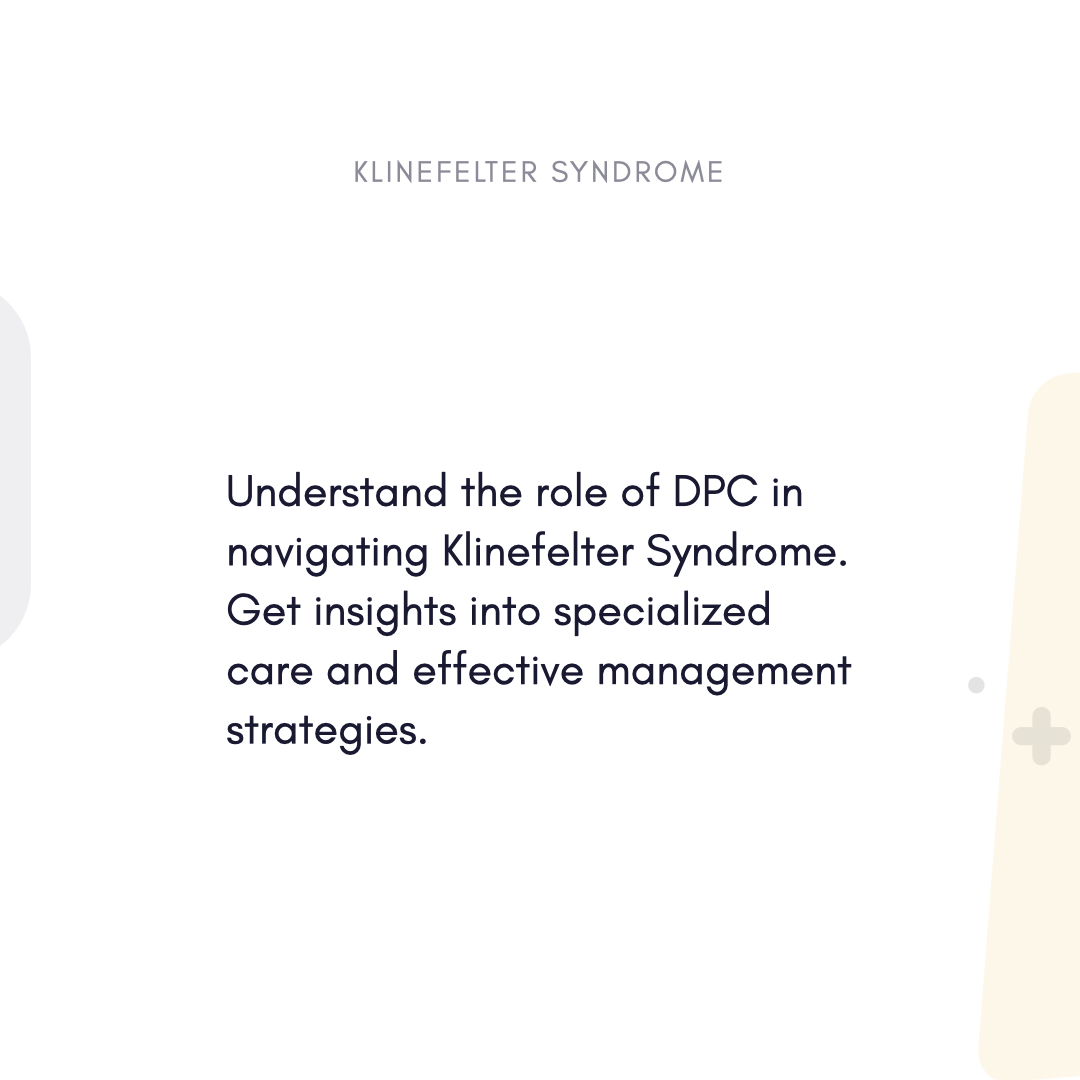Klinefelter Syndrome and Direct Primary Care (DPC): Lifelong Support for Health and Wellness
If you or a loved one has been diagnosed with Klinefelter Syndrome (KS)—a genetic disorder affecting 1 in 650 men—you are aware of the difficulties in managing hormonal imbalances, fertility problems, and mental health risks. Although KS requires lifetime, multidisciplinary care, navigating fragmented healthcare systems can be daunting. Direct Primary Care (DPC) combines personalized medicine, affordability, and continuity to meet the specific needs of KS patients.

Recognizing Klinefelter Syndrome (KS)
Men born with an extra X chromosome develop Klinefelter Syndrome (47,XXY). Although symptoms vary, common features include:
- Low testosterone: Osteoporosis, tiredness, reduced muscular mass.
- Infertility: Small testes and poor sperm count.
- Developmental delays: Speech, motor, or learning difficulties in childhood.
- Mental health hazards: Increased anxiety, ADHD, and depression.
Long-term risks without attention:
- Diabetes, heart disease, metabolic syndrome.
- Autoimmune diseases like lupus.
- Osteoporosis and fractures.
How DPC Transforms KS Management
Under the membership concept known as Direct Primary Care (DPC), patients pay a monthly fee—usually USD 50–USD 150—for unlimited access to their doctor. This means for KS patients no insurance barriers, no rushed visits, and treatment catered to hormonal, psychological, and reproductive needs.
Individualized, Interdisciplinary Care
Following recommendations from the American Association of Clinical Endocrinologists (AACE), DPC providers offer:
- Hormone replacement therapy (HRT): Custom testosterone plans (gels, injections) to raise mood, bone density, and energy.
- Fertility preservation: Early referrals to IVF or sperm retrieval experts.
- Mental health integration: Discounted depression or anxiety counseling.
- Developmental support: Teaming with teachers or speech therapists for childhood delays.
Proactive Comorbidity Monitoring
DPC guarantees:
- Annual blood pressure, cholesterol, and glucose checks to prevent heart disease.
- Discounted DEXA scans starting at age 30 to fight osteoporosis.
- Early diagnosis via fast genetic testing and hormone analyses to reduce long-term risks.
Cost-Effective, Transparent Treatment
DPC clinics lower expenses by:
- Wholesale-priced labs: Testosterone panels, lipid profiles, and genetic tests for under USD 20.
- Discounted imaging: Cash-priced DEXA scans or ultrasounds.
- No hidden fees: Flat monthly rates handle urgent needs, care coordination, and unlimited visits.
DPC’s Personalized KS Management
DPC tailors treatment to your specific needs:
- Reproductive health and hormones:
- Testosterone dosage adjustments based on lab results and symptoms.
- Coordination with urologists for IVF or sperm cryopreservation.
- Gynecomastia treatment: Referrals for breast reduction surgery if necessary.
- Mental and developmental support:
- ADHD/anxiety management: Medication plans or cognitive behavioral therapy (CBT).
- Parental guidance: Help securing IEP/504 school accommodations.
- Chronic disease prevention:
- Bone health: Weight-bearing exercise regimens and calcium/vitamin D supplements.
- Cardiac care for high-risk patients: EKGs or stress tests.
Real-Life Success Stories
- Case 1: Sixteen-year-old Jake battled poor focus and tiredness. His DPC doctor diagnosed KS, started testosterone therapy, and linked him with a tutor. In six months, his grades and confidence improved significantly.
- Case 2: Marcus, 34, avoided osteoporosis thanks to annual DEXA scans and customized HRT through his DPC clinic. He now mentors newly diagnosed KS patients.
Frequently Asked Questions: DPC and Klinefelter Syndrome
- Q: Can DPC assist with KS-related infertility?
A: True! Often at agreed cash rates, DPC doctors coordinate reproductive endocrinologists for sperm retrieval or IVF.
- Q: For lifetime KS care, is DPC reasonably priced?
A: Absolutely. Members save USD 200+ monthly on specialist co-pays, labs, and imaging.
- Q: If I need a geneticist, what then?
A: DPC doctors guarantee seamless care transitions and streamline referrals.
Why DPC Wins for Klinefelter Syndrome Patients
KS requires a complete strategy addressing psychological, hormonal, and reproductive needs. DPC’s approach shines by:
- Breaking care silos: One provider oversees all aspects from adolescence to adulthood.
- Prioritizing prevention: Early interventions lower heart disease, osteoporosis, and mental health risks.
- Empowering patients: Tools for advocacy and education enable thriving in relationships, work, and school.
Take Charge of Your Health Journey Today
Klinefelter Syndrome need not define your possibilities. DPC helps you find a committed partner offering affordable, personalized care that balances hormones, protects mental health, and preserves fertility.
- Backed by expertise and compassion, DPC helps you live fully from puberty through adulthood.
- Customized plans for hormone therapy, mental wellness, and preventive care.
- Financial clarity—no hidden costs or insurance hurdles.






